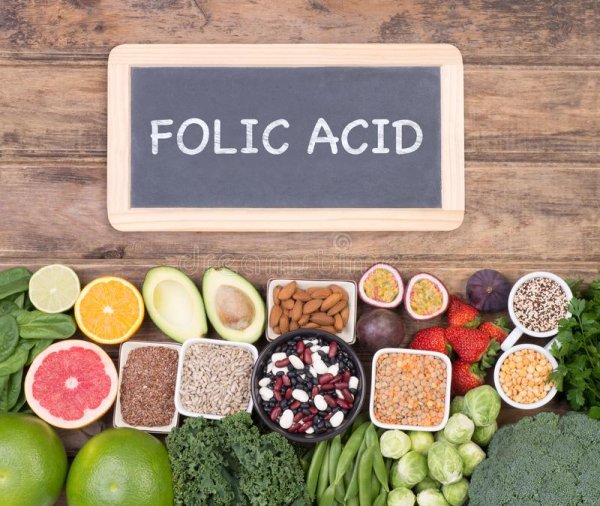Folic Acid for a Healthy Brain


Written and verified by the psychologist Valeria Sabater
The benefits of folic acid for your brain are extraordinary. This folate, also known as vitamin B9, improves the effectiveness of anti-depressants. Likewise, we know that it’s crucial for cell detoxification and neurotransmitter production. Not only that, but it also slows down cognitive deterioration.
Do you like lentils or do you usually skip them in favor of other things? Whatever the case, lentils are a superfood. They contain nutrients like folic acid that are essential for improving your mood, your cognitive function, and overall brain health.
When we talk about folic acid, people usually think about pregnancy, or women trying to conceive.
The brain needs to maintain an adequate level of folic acid. Low levels of this folate are linked to higher levels of homocystein. Homocystein is an amino acid that increases brain inflammation and the risk of stroke.
We know that this folate is key for good fetal development. A deficit of folic acid can cause serious birth defects like spina bifida or neural tube defects.
Vitamin B9 is an excellent supplement for optimizing cognitive function. What’s more, studies from several universities in the Netherlands show that folic acid can help you reach old age with a healthier brain.
In addition, folic acid can help significantly reduce the rates of stroke and dementia. As you can see, something as simple as improving your diet can help you reach old age with a quick mind and a strong cognitive reserve.

Benefits of folic acid for brain health
Psychiatry magazines have been publishing articles on this subject for more than three years now. Articles in the Journal of Clinical Psychiatry reveal what this little molecule is capable of doing for us. In this regard, we know that certain psychiatric medications reduce the amount of folic acid in the brain. One example would be the drugs psychiatrists prescribe for patients with bipolar disorder.
The reduction is so significant that doctors preventatively prescribe vitamin supplements. We also know that folic acid can improve how a patient responds to anti-depressants. Consequently, a diet rich in folic acid, along with proper medications, can result in faster and more stable health improvements.
If everything in the brain is chemistry, folic acid is the mediator that makes all these reactions possible. It’s very useful to keep that in mind. Let’s take a look at the specific benefits that folic acid has for the brain.

Take folic acid to improve your mood
There are several studies that show how getting enough folic acid can improve your mood and increase serotonin production. Specialists also believe that the best folic acid you can take is l-methylfolate. That’s because the half-life of l-methylfolate in the human body is higher than other types.
We also know that some people have a genetic inability to correctly metabolize folic acid. As a result, they don’t have adequate levels of folic acid in their bodies. They also suffer from related illnesses and have a higher risk of developing certain mood disorders.
These days, many psychiatrists recommend taking folic acid supplements. They believe it helps improve recovery and their patient’s overall mood.
Folic acid deficiency increases brain inflammation
Methylfolate is essential for the brain to make neurotransmitters and DNA. Without adequate levels of this folate, whether from a poor diet or genetic problems, several things can happen. The most alarming one is a high homocysteine concentration.
Remember, homocysteine is a chemical compound that has to do with inflammation and high blood pressure. High homocysteine leads to a higher risk of stroke. Not only that, but more and more scientists are supporting the inflammation theory of depression. This theory says that a high level of homocysteine plays a role in the development of depressive disorders.

Better memory with folic acid and vitamin B12
According to a study by Janine Walker, a researcher at the Australian National University, people who take a healthy dose of this folate and vitamin b12 for three years or more reach old age in better health. They have lower rates of Alzheimer’s, better memories, and they maintain their cognitive reserves. Not only that, but they keep their mind sharp and enjoy a more active life.
Knowing all of this makes it much easier to follow specialists’ advice. They believe that, after the age of 60, you should increase your intake of these nutrients. It isn’t difficult to do, and the benefits are significant.

What foods are rich in folic acid?
By now, you may be thinking about jumping in the car and heading to the pharmacy to buy some supplements. That, however, is not the best way to get your daily dose, especially if you don’t have a prescription from a doctor, psychiatrist, or dietician.
It’s better to pay attention to your specific needs. If you don’t have a diagnosed vitamin deficiency, the best thing is to stay healthy by incorporating more foods that are rich in this folate. You can find the following in any supermarket:
- Lentils.
- Chickpeas.
- Asparagus.
- Spinach.
- Broccoli.
- Avocado.
- Strawberries.
- Oranges.
- Papaya.
- Raspberries.
- Brussels sprouts.
- Celery.
In conclusion, you can see that folic acid isn’t just for pregnant woman. All of us, especially as we age, have to pay special attention to make sure we get enough of this folate that is so important for a healthy brain.
This text is provided for informational purposes only and does not replace consultation with a professional. If in doubt, consult your specialist.








